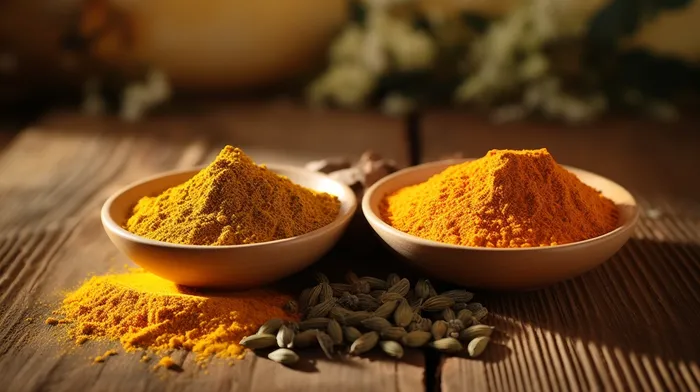If you’re seeking a natural solution to help fight inflammation, you’re in luck. A particular compound found in a common spice holds the key to providing relief from inflammatory health conditions like joint pain and swelling. We’re talking about curcumin, the main component of the bright yellow Indian spice, turmeric.
Curcumin: The Magic Ingredient
Turmeric (Curcuma longa) has been an essential ingredient in Indian cuisine and traditional Ayurvedic medicine for thousands of years. Curcumin, responsible for turmeric’s stark yellow color, has been extensively studied for its anti-inflammatory, antioxidant, and anticancer properties. Research suggests that curcumin’s potency is comparable to over-the-counter anti-inflammatory drugs – without the usual side effects.
Battle Against Inflammation
Inflammation is your body’s natural response to injury or infection. However, when inflammation becomes chronic, it can cause a host of health issues such as arthritis, heart diseases, cancer, and even Alzheimer’s. Curcumin shows great promise in minimizing the effects of a molecule called NF-kB, responsible for triggering inflammation in cells. By inhibiting this molecule, curcumin may be an effective tool in battling inflammation and related diseases.
Curcumin for Arthritis and Joint Pain
Arthritis, an inflammatory condition affecting the joints, is a common cause of pain and disability. Studies show that curcumin supplementation can provide relief for arthritis symptoms. In one study, it was found that a highly bioavailable form of curcumin was more effective in reducing joint pain and swelling than a popular nonsteroidal anti-inflammatory drug (NSAID).
Curcumin and Heart Health
Heart disease is a leading cause of death worldwide. Research suggests that curcumin can help improve endothelial function, essential for maintaining the blood vessels’ health. In a study of 121 individuals who were candidates for coronary artery bypass surgery, participants received either 4 grams of curcumin or a placebo daily. The curcumin group had a 65% reduced risk of experiencing a heart attack in the hospital.
Curcumin’s Anticancer Properties
Curcumin has been studied for its potential to prevent and treat various types of cancer, including breast, colon, and pancreatic cancer. By inhibiting NF-kB, curcumin can block the growth and spread of cancer cells. Additionally, it has been found to act synergistically with certain chemotherapy drugs, allowing for lower doses and, thus, reduced side effects.
Curcumin and Brain Health
Alzheimer’s disease, the most common form of dementia, remains a major concern for an aging population. Curcumin’s ability to cross the blood-brain barrier makes it a promising agent for combating Alzheimer’s by limiting the buildup of amyloid-beta plaques associated with the disease. Furthermore, its antioxidant properties help protect delicate brain cells from oxidative damage.
Depression and Curcumin
Depression is a widespread mental health issue. Research suggests that curcumin’s antidepressant effects may involve modulating levels of brain-derived neurotrophic factor (BDNF), a growth hormone responsible for neuronal health. In a study of 60 depressed patients, a combination of curcumin and the antidepressant fluoxetine proved more effective in treating depressive symptoms than fluoxetine alone.
Increasing Curcumin’s Bioavailability
Despite curcumin’s remarkable health benefits, its bioavailability (the amount that is absorbed by the body) is relatively low. One reason for this is that curcumin is rapidly metabolized and eliminated from the body. To maximize its absorption, consume curcumin with black pepper, which contains the compound piperine, or with healthy fats like coconut oil and avocado. Piperine increases curcumin’s bioavailability by up to 2,000% due to its inhibitory effect on certain metabolic enzymes, making it a convenient and effective way to enhance curcumin absorption.
Curcumin Supplements
Curcumin supplements are an easy way to incorporate the power of curcumin into your daily routine. Many supplements include piperine, ensuring increased bioavailability. Be sure to choose a reputable brand with high-quality ingredients to maximize the potential health benefits. Always consult with a healthcare professional before adding a new supplement to your regimen, especially if you are pregnant, nursing, or have pre-existing medical conditions.
Including Turmeric in Your Diet
Incorporating turmeric into your diet is a tasty and effective way to enjoy the benefits of curcumin. Use it as a seasoning in savory dishes, add a pinch to your smoothies or oatmeal, or even try golden milk – a comforting, turmeric-infused beverage. Discover the power of this vibrant spice by adding it to your recipes, and experience the health-promoting potential of curcumin firsthand.
In conclusion, curcumin, the main component of turmeric, is a powerful anti-inflammatory compound with a myriad of potential health benefits, ranging from easing joint pain to improving heart and brain health. By incorporating curcumin into your daily routine, whether through supplements or by adding turmeric to your diet, you can experience the remarkable advantages of this natural remedy. The golden spice may just hold the key to living a healthier, pain-free life.



